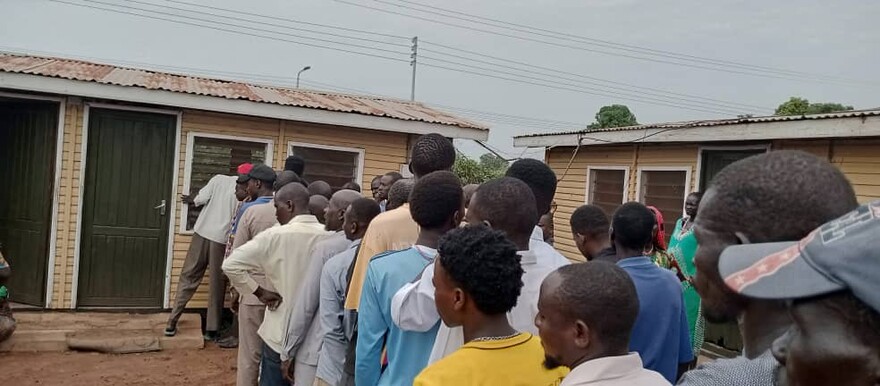The Relief and Rehabilitation Commission (RRC) in Lakes State has initiated an official registration process for South Sudanese returnees and Sudanese refugees.
The chairperson of the Relief and Rehabilitation Commission in Lakes State, Dut Malual Chahoch, told Radio Tamazuj on Thursday that the registration for returnees and Sudanese refugees is currently underway.
He pointed out that the gathering point will be at the Akon-Buoi centre, where the Sudanese refugees will meet the UNHCR team and other humanitarian partners, including the Refugees Commission.
“Our office has witnessed an influx of refugees and returnees who have fled Sudan due to the fighting in Khartoum, including cattle-keeping communities. They have sought refuge here,” he stated. “Additionally, there are South Sudanese returnees who fled to Sudan during the crisis in 2013. They have also returned, and the registration of Sudanese refugees is ongoing. We have registered 223 households in Rumbek and 960 households in Cueibet County.”
Chahoch mentioned that these households primarily consist of cattle keepers from the Bagari and Falata communities, who are considered refugee cattle keepers in Lakes State.
“We have already resettled some returnees in Lakes State, totalling 580 households. They are currently being reintegrated into their original communities. We are collaborating with humanitarian agencies and host communities to ensure that these 580 households receive food assistance and other basic necessities for a period of three months, enabling them to fully integrate into the community,” he explained.
“For Sudanese refugees, a team composed of UNHCR, the refugees’ commission, and other relevant parties will arrive this week to assess the needs of the Sudanese refugees residing in Rumbek, as well as the returnees from Khartoum. The assessment will be based on the refugee cards or tokens issued to them,” he continued.
Chahoch clarified that the assessment will be conducted based on the cards given to refugees in Sudan and the tokens provided to Sudanese refugees upon crossing into South Sudan.
“The refugees are currently present, and one of the gathering points will be the Akon-Buoi centre, where they will meet the UNHCR team. We want them to feel at ease and at home. The situation is challenging. We, as South Sudanese, were once refugees ourselves during the SPLA days in the 1990s when we sought refuge in Ethiopia. These issues are not new to us. Unfortunately, in times of war, the likelihood of becoming a refugee increases. However, we pray for Sudan and hope that the conflicts can be addressed as soon as possible,” he asserted.
Sarah Adam, a Sudanese refugee residing in Rumbek who escaped from Khartoum, expressed that the situation in Rumbek is comparatively better than in Khartoum, where intense fighting between the Rapid Support Forces (RSF), a formally government-trained and armed paramilitary group, and the Sudan Armed Forces (SAF) has erupted.
“In Khartoum, people are suffering. There is a lack of food, drinking water, and electricity. I came to Rumbek because I have a relative engaged in business here,” she explained.
Ustaz Abdalla Abullal, who also fled conflicts in Nyala, Darfur, stated that they left Sudan due to the ongoing and escalating conflict between the Rapid Support Forces (RSF) and the government-backed Sudanese Armed Forces (SAF), which now poses a threat to the entire Sudanese state.
“We travelled through Majullet to Merrem and then from Merrem to Aweil until we reached Rumbek. The journey takes many days and weeks, and sometimes we have no access to food or water, making it an extremely challenging situation,” he revealed.
He emphasized that South Sudan and Sudan are essentially one country with minor differences, considering South Sudan as their “small home” and Sudan as their “biggest home.”




